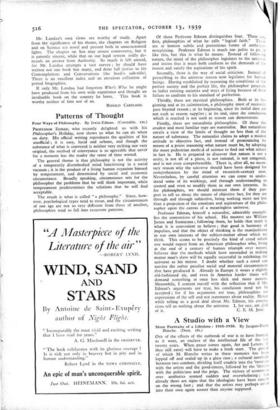Patterns of Thought
Four Ways of Philosophy. By Irwin Edman. (Constable. 12s.) PROFESSOR EDMAN, who recently delighted us with his Philosopher's Holiday, now shows us what he can do when on duty. His official writing reproduces the qualities of his unofficial ; it is easy, lucid and urbane, and though the substance of what is conveyed is neither very striking nor very original, the method of conveyance is so agreeable that never for a moment has the reader the sense of time wasted.
The general theme is that philosophy is not the activity of a temporarily disembodied mind functioning in a social vacuum ; it is the product of a living human organism biassed by temperament, and determined by social and economic circumstance. Broadly speaking, circumstance sets for the philosopher the problems that he will think important, while temperament predetermines the solutions that he will find acceptable.
The result is what is called " a philosophy." Since, how- ever, psychological types tend to recur, and the circumstances of one age are not so very different from those of another, philosophies tend to fall into recurrent patterns.
Of these Professor Edman distinguishes four. There are, first, philosophies of what he calls " logical faith." These are at bottom subtle and pretentious forms of anthropo_ morphizing. Professor Edman is much too polite to put it like this, but this is what he means. Instead of following -nature, the mind of the philosopher legislates to the universe and insists that it must both conform to the demands of his reason and satisfy the aspirations of his spirit.
Secondly, there is the way of social criticism. Instead of prescribing to the universe reason now legislates for human beings. Having established by reasoning the conditions of the perfect society and the perfect life, the philosopher proceeds to indict existing societies and ways of living because of their failure to conform to his standard of perfection.
Thirdly, there are mystical philosophies. Both at its be- ginning and at its culmination, a philosophy must of necessity pass beyond reason ; at its beginning, since its initial data are not such as reason supplies ; at its end, since the conclusion which is reached is not such as reason can demonstrate.
Finally, there are naturalistic philosophies. Of these the crudest and most familiar type are materialist. But naturalism entails a view of the limits of thought no less than of the nature of substance. The naturalist claims to adopt a modest attitude to objective fact, and instead of pronouncing by means of a priori reasoning what nature must be, by adopting the more pedestrian method of science to find out what nature in fact is. He is prepared to discover that nature is not a unity, is not all of a piece, is not rational, is not congenial, and is not even comprehensible. There is, after all, no neces- sary reason why the universe should have been designed for comprehension by the mind of twentieth-century man. Nevertheless, by careful attention we can come to under- stand some of its workings, and through understanding to control and even to modify them in our own interests. As for philosophies, we should mistrust them if they pur- port to tell us about the nature of objective fact, for they are through and through subjective, being nothing more nor less than a projection of the emotions and aspirations of the philo- sopher upon the canvas of a meaningless universe.
Professor Edman, himself a naturalist, admirably exempli- fies the contentions of his school. His masters are William James and Santayana ; following them, he holds that truth is what it is convenient to believe ; that good is harmony of impulses, and that the object of thinking is the manipulation in our own interests of the subject-matter about which we think. This seems to be precisely the kind of creed which one would expect from an American philosopher who, living at the end of a century of human triumph over nature, believes that the methods which have succeeded in making matter man's slave will be equally successful in exhibiting the universe as his mirror. I doubt whether such a creed can survive the rather peculiar social and material circumstances that have produced it. Already in Europe it wears a slightly old-fashioned air, and even in America harder times will demand something at once less slick and more austere. Meanwhile, I content myself with the reflection that if Mr. Edman's arguments are true, his conclusion need not be accepted ; for if his arguments are true, philosophies are expressions of the self and not statements about reality. Hence while telling us a good deal about Mr. Edman, his conclu- sions tell us nothing about the universe. I, for one, am glad










































 Previous page
Previous page